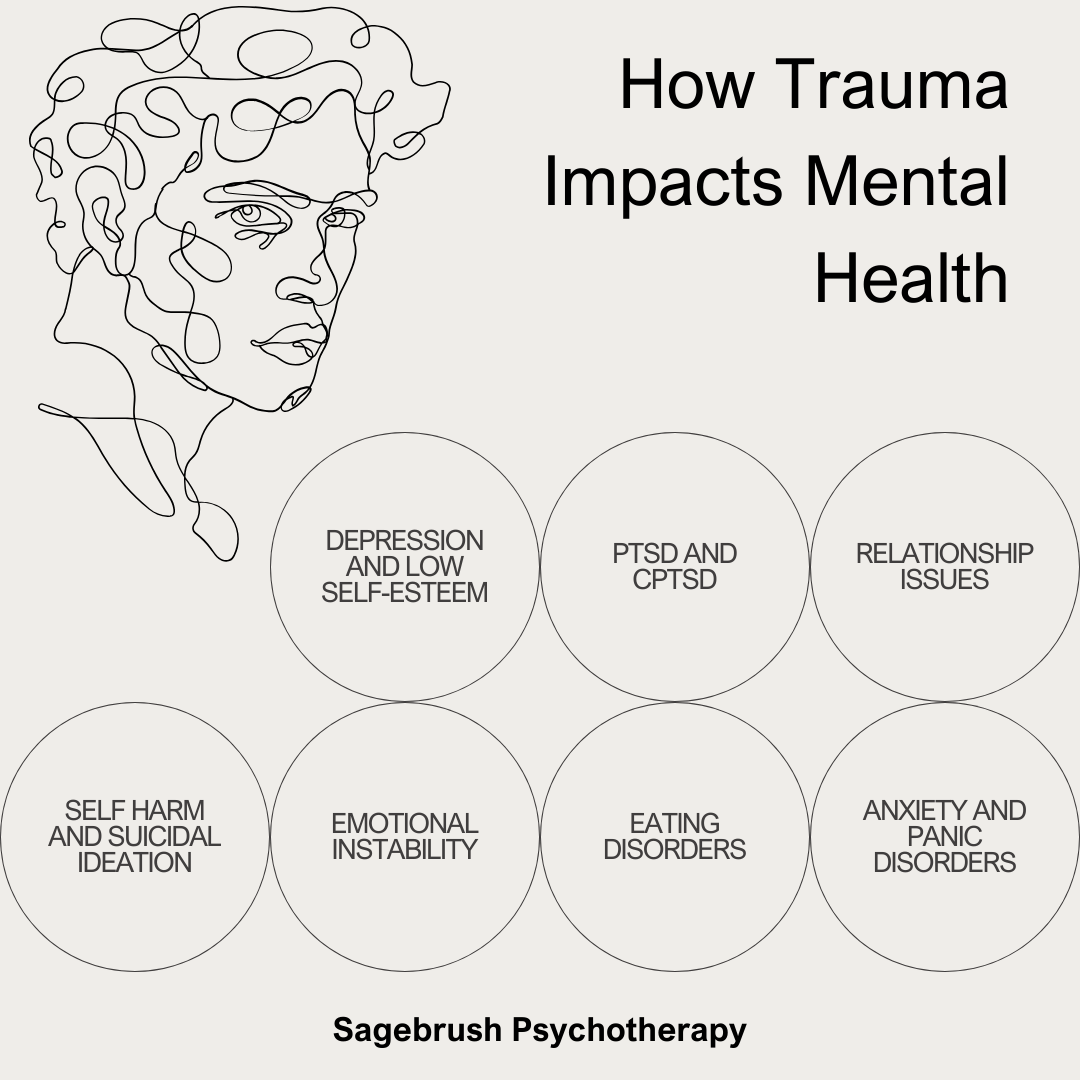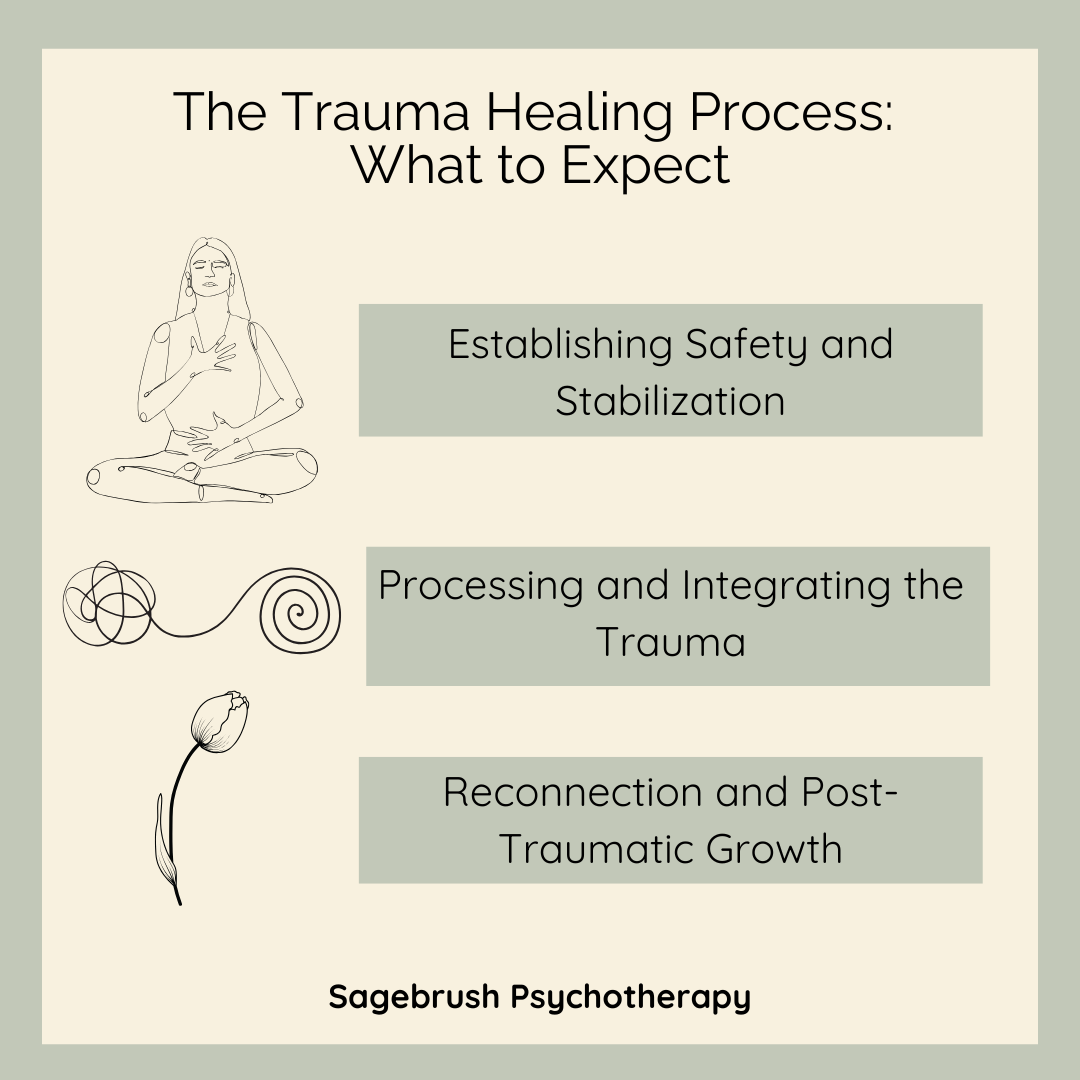Trauma Therapy in Los Angeles: Heal and Reclaim Your Life
If the effects of trauma are keeping you from the peace and fulfillment you deserve, we see you. Trauma's impact is multifaceted, often leading to emotional pain, physical symptoms, and challenges in interpersonal relationships. We approach your care with compassion and a commitment to treating trauma in a way that respects your unique needs. Healing is possible, and together we'll take the steps toward rebuilding your sense of safety, connection, and emotional resilience.
Trauma therapy can help you navigate painful memories, regulate your nervous system, and find relief from distressing emotions. Together, we'll take a look at what parts of your history might be affecting your current struggles to better understand your psyche and work together to find solutions that work for you.
Working with a Trauma Therapist at Sagebrush Psychotherapy
Treating trauma requires a specialized and nuanced approach because of the potential for re-traumatization during the healing process. At Sagebrush Psychotherapy, our therapists are specifically trained in trauma-informed care to ensure the treatment we provide is both safe and effective.
We treat trauma because we understand how it shakes your world, alters your sense of safety, and impacts your relationships. We recognize that clients experiencing trauma carry these emotional and physical scars every day, often feeling stuck in patterns of fear, self-doubt, or pain.
Our approach to healing trauma works in two ways: starting with the body (bottom-up) and starting with the mind (top-down). Bottom-up methods, like somatic therapy and EMDR, focus on how trauma affects the body, helping to release stored stress and calm physical reactions like tension, anxiety, or feeling “on edge.” Top-down methods, like CBT and DBT, focus on how trauma affects thoughts and emotions, helping you change negative thinking patterns, manage emotions, and improve behaviors. By integrating these methods, we provide a holistic approach to trauma-informed therapy tailored to your individual needs.
Trauma Diagnoses and Conditions
Trauma manifests in various ways, leading to different diagnoses that require specialized treatment. Some of the most common trauma-related conditions include:
Post-Traumatic Stress Disorder (PTSD)
Symptoms: Flashbacks, nightmares, hypervigilance, difficulty sleeping, emotional numbness, and intense distress when reminded of the trauma.
How It Feels: Living with PTSD can feel like being trapped in the past, as if the traumatic event is still happening. Everyday sounds, places, or situations can trigger overwhelming fear, anxiety, or panic, making it hard to feel safe or at ease.
Complex Trauma (C-PTSD)
Symptoms: Severe emotional dysregulation, chronic fear or shame, difficulty trusting others, self-blame, and struggles in relationships.
How It Feels: Unlike PTSD, which is often caused by a single event, C-PTSD develops from repeated or prolonged trauma, such as childhood abuse or ongoing neglect. It can leave people feeling emotionally overwhelmed, unworthy, or constantly on edge, making it difficult to build healthy relationships or feel a sense of belonging.
Dissociative Disorders
Symptoms: Memory gaps, detachment from reality, feeling disconnected from one’s body, or experiencing different identities or personality states. Derealization makes the world feel unreal or dreamlike, while depersonalization creates a sense of being disconnected from oneself, as if watching life from the outside.
How It Feels: It can feel like floating outside your body, losing time, or feeling like different versions of yourself at different moments. It can feel like zoning out, losing time, or feeling like a stranger in your own body, making it difficult to stay present or engaged in daily life.
Trauma and Links to Other Mental Health Conditions
Trauma can manifest in many ways and contribute to the development of various mental health conditions. Our mental health professionals work with clients struggling with:
Anxiety and panic disorders
Depression and low self-esteem
Eating disorders
Relationship issues and emotional dysregulation
Self-harm and suicidal ideation
Trauma in the Body: Understanding the Mind-Body Connection
Trauma doesn't just live in the mind—it embeds itself in the body. Many individuals who have experienced trauma develop physical symptoms such as chronic illness, tension, fatigue, and digestive issues. The nervous system becomes dysregulated, leading to heightened anxiety, hypervigilance, or dissociation.
At our Los Angeles, CA practice, our trauma therapists understand that trauma isn’t just something you remember—it also affects your body, emotions, and behaviors. Many people experience mental health or physical health concerns without realizing it’s connected to past trauma.
In therapy, we help clients regulate their nervous system so they can feel calmer, more balanced, and in control of their emotions and body. Trauma can keep the nervous system stuck in survival mode, making it hard to relax or feel safe. By using breathing exercises, gentle movement, and mindfulness, we help the body release tension, reduce stress, and restore a sense of calm. This approach allows clients to reconnect with their bodies and find relief from overwhelming emotions and physical symptoms.
Trauma Therapy in Los Angeles: Healing and Recovery
The Trauma Healing Process: What to Expect
Healing from trauma is a gradual journey. Although each individual's path is unique, recovery generally looks like this:
Establishing Safety and Stabilization
Before processing trauma, it's crucial for individuals to feel physically and emotionally secure. This stage emphasizes nervous system regulation, helping individuals transition from chronic stress responses like fight, flight, or freeze to a state of stability. Therapy during this phase focuses on building coping strategies for emotional regulation. Strengthening support systems, practicing self-care, and engaging in grounding techniques are vital steps in establishing safety.
Processing and Integrating the Trauma
Once individuals feel more stable, they can begin working through traumatic memories in a safe, structured manner. This stage aims to help individuals reprocess distressing experiences and shift negative self-beliefs formed by trauma. Therapy aids in grieving past experiences, understanding the impact of trauma, and reframing negative thoughts.
Reconnection and Post-Traumatic Growth
The final stage involves rebuilding a meaningful life beyond trauma. As individuals integrate their healing, they develop stronger relationships, healthier boundaries, and a greater sense of trust in themselves and others. This stage emphasizes rediscovering personal identity and exploring new possibilities for fulfillment. Individuals learn to move forward without being defined by past trauma.
Healing is not always linear, but with consistent support, self-awareness, and personal growth, individuals can create a future that feels safe, fulfilling, and whole.
What is EMDR Therapy?
Eye Movement Desensitization and Reprocessing (EMDR) is an evidence-based therapy that helps the brain process traumatic memories and reduce their emotional intensity. EMDR works by using bilateral stimulation, which means activating both sides of the brain through guided eye movements, tapping, or auditory tones. This process helps the brain reprocess distressing experiences, making them feel less intrusive, overwhelming, or painful over time.
The EMDR procedure follows eight structured phases, beginning with history-taking and preparation, followed by guided recall of the traumatic memory while engaging in bilateral stimulation. This allows the brain to integrate the experience in a new, less distressing way.
Highlighting Some Areas of Focus in Trauma Therapy
Healing from Sexual Trauma
Sexual trauma refers to any unwanted sexual experience that causes emotional, psychological, or physical distress. Experiencing sexual trauma may leave you feeling disconnected, ashamed, or overwhelmed by emotions that can be difficult to navigate. You may experience anxiety, depression, self-esteem challenges, intrusive thoughts, nightmares, difficulties in intimate relationships, or a sense of disconnection from your body or emotions.
We aim to help you address the emotional and physical effects of sexual trauma. We focus on supporting you in regaining control over your life, fostering self-compassion, and reconnecting with your sense of self and body.
Addressing Relationship Trauma and Domestic Violence
Relationship trauma, including domestic violence, occurs when individuals experience chronic emotional, physical, or psychological harm in close relationships. It may leave you feeling trapped in fear, self-doubt, or hopelessness. Survivors of these experiences might find themselves feeling hypervigilant, fearful of intimacy, struggling with flashbacks, guilt, shame, anxiety, low self-esteem, and having difficulty trusting others. Living with this type of trauma can sometimes feel like walking on eggshells, even long after the harmful relationship has ended. You may find it challenging to set boundaries, trust yourself, or form healthy connections.
We seek to address the emotional wounds caused by control, manipulation, or violence while empowering you to rebuild a sense of safety and confidence. Whether you're recovering from past abuse or navigating the aftermath of a harmful relationship, our therapists will work with you to help you break free from the cycle of trauma and reclaim your life.
Developmental Trauma
Developmental trauma occurs when a child experiences chronic stress, neglect, or abuse during crucial stages of emotional and psychological growth. These traumatic experiences can disrupt nervous system regulation, impair self-esteem, and lead to long-term mental health issues. Many patients who have experienced developmental trauma struggle with anxiety, emotional dysregulation, and difficulties in interpersonal relationships.
When helping individuals heal, we focus on addressing the deep emotional, cognitive, and physiological effects of early adverse experiences. Since developmental trauma often impacts relationships, therapy also focuses on healing attachment wounds, fostering trust, setting boundaries, and improving relational patterns. Additionally, we support clients in rebuilding self-esteem and identity, helping them shift negative self-beliefs shaped by early experiences into a more compassionate and empowered self-view. We create a safe space for individuals to process their past, regulate their emotions, and develop healthier patterns for the future.
Resources to Get You Started
7 Tools for Managing Traumatic Stress
This resource from NAMI outlines practical strategies such as grounding techniques, mindfulness, and self-care to help individuals cope with traumatic stress.
Hosted by Guy Macpherson, this podcast features interviews with leading trauma experts, offering insights into trauma recovery and effective therapeutic approaches.
Used in EMDR therapy, bilateral stimulation music alternates sound between the left and right ears to help process trauma, reduce anxiety, and promote relaxation.
In this video, Dr. Peter Levine, clinical psychologist, guides viewers through a simple Somatic Experiencing® exercise designed to ease feelings of despair by helping the body release stored trauma and restore a sense of safety and balance.
Calm Safe Place & Container: EMDR Therapy
Dr. Jamie Marich, clinical psychologist, demonstrates telehealth EMDR therapy preparation techniques, guiding viewers through the Calm Safe Place and Container exercises to help manage distressing emotions and establish a sense of safety.
Frequently Asked Questions
-
Intrusive memories are unwanted, distressing recollections of traumatic events that can appear suddenly and feel vivid or overwhelming. They may include flashbacks, disturbing images, or strong emotional reactions triggered by reminders of the trauma.
-
A trigger is anything—such as a sound, smell, place, or situation—that reminds you of a traumatic experience and causes an emotional or physical reaction. Triggers can bring up intense feelings, intrusive memories, or behaviors related to the trauma. Identifying and understanding triggers is an essential step in trauma therapy, helping you regain control and reduce their impact on your daily life.
-
Yes, trauma can cause dissociation. Dissociation is a coping mechanism where your mind disconnects from thoughts, feelings, memories, or surroundings, often as a response to overwhelming stress or trauma. It may feel like zoning out, detaching from reality, or experiencing memory gaps. While dissociation can provide temporary relief, it can also make processing trauma more challenging.
-
Trauma can lead to various mental health issues, including anxiety, depression, eating disorders, and dissociative disorders. Many patients experience difficulties in self-esteem, emotional regulation, and interpersonal relationships due to unresolved trauma.
-
Look for a therapist with specialized training in trauma therapy, such as EMDR, somatic therapy, or TF-CBT, and experience working with trauma survivors. Beyond credentials, goodness of fit is essential—choose a therapist whose style makes you feel safe, heard, and supported. Consider factors like their approach (structured vs. open-ended), cultural competency, and ability to meet your specific needs. A good trauma therapist will provide compassionate care, patient-centered treatment, and a sense of trust in the therapeutic relationship. It may take time to find the right fit, but prioritizing comfort and connection can make therapy more effective.
-
Well known and supported approaches include Eye Movement Desensitization and Reprocessing (EMDR), Dialectical Behavior Therapy (DBT), Trauma-Focused Cognitive Behavioral Therapy (TF-CBT), Somatic Experiencing (SE), and Internal Family Systems (IFS). These methods are proven to help individuals process traumatic memories, regulate emotional responses, and develop coping strategies that promote well-being.
Start Trauma Therapy in Los Angeles
Healing from trauma is possible. Our private practice in Los Angeles, CA provides compassionate care to help you find healing, manage emotions, and rebuild trust. Through evidence-based approaches like talk therapy and EMDR, we support your journey toward recovery.
You deserve a life free from the weight of past trauma and the patterns it may have created. You can reclaim your sense of safety, self-worth, and connection to yourself and others. If you're struggling, now is the time to seek treatment.
Our trauma therapists offer in-person sessions in the Los Angeles area and virtual sessions for California residents. Take the first step toward mental health and well-being. Contact us today to start trauma therapy in Los Angeles.










